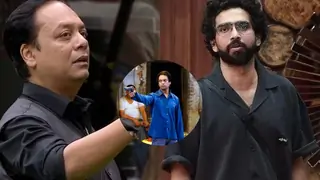The text says that other than Karṇa, Śakuni, and Dhārtarāṣṭra (Duryodhana), everyone in the hall felt a lot of pain seeing Kṛṣṇā Draupadī dragged by Duḥśāsana. Retellings on TV may give you the impression that each character knew right from wrong and the only reason he didn't speak out was some pratijñā or kartavya, some vow or obligation. However, the text doesn't mention these considerations at all.
Bhīṣma speaks: "Due to the subtlety of dharma, attractive one! I am unable to decide this question of yours properly. One who isn't free is in fact incapable of staking a dependent, and yet I consider a woman's subjection to her husband. Yudhiṣṭhira would give up the entire prosperous earth and still would not abandon truth; that son of Pāṇḍu said, "I am forfeit," and so I cannot decide this. Śakuni is an unmatched gambler among men, and he prompted Kuntī's son for what he wanted; yet the great-natured one does not consider it cheating, and so I don't answer this question of yours."
Kṛṣṇā Draupadī replies: "Invited to the hall by experts, perverse-natured, deceitful, ignoble, and fond of gambling, the king who had not practised it too much - tell me, why was he prompted for what they wanted? With pure intentions, unaware of the practice of deceit, that leader of the Kurus and the sons of Pāṇḍu was enslaved by all of them planning together, and even after that, since he was directed what to stake, let all of these Kurus who remain in the hall, who are in control of their sons and daughters-in-law, consider what happened and my argument, and answer this question of mine properly."
Neither Bhīṣma nor Kṛṣṇā Draupadī talks about the assault or indignity that she is suffering at that very moment, as Duḥśāsana is still dragging her and taunting her with harsh words, and she is wailing piteously. The idea of treating every woman with respect is absent on both sides: Bhīṣma makes the point that a slave-man can always direct his wife (to another man) even if he is ineligible to gamble her away, and Kṛṣṇā Draupadī argues that injustice was done to her disadvantaged husband, not to herself. Bhīṣma thinks that Śakuni prompting Yudhiṣṭhira for a specific stake makes the round invalid, and yet "mahātmā" - the great-natured one - does not call it cheating. Here, "mahātmā" probably refers to Yudhiṣṭhira; Bhīṣma trusts him to tell the truth at any cost, and Bhīṣma doubts his own judgement when it conflicts with Yudhiṣṭhira's. The flaw in Bhīṣma's logic is that Yudhiṣṭhira cannot point out cheating by his opponent after promising to be a loyal slave even to his own detriment. Bhīṣma knows that as soon as Yudhiṣṭhira admitted to being a slave, he should have stopped gambling with his owner, and yet Bhīṣma cannot bring himself to say that Yudhiṣṭhira lied when he staked his wife.
No one volunteers to answer Kṛṣṇā Draupadī's question; we don't know why they allow Duḥśāsana to go on harassing her verbally and physically. Bhīma says to Yudhiṣṭhira: even in places where women-for-rent (bandhakyaḥ) wait for lucky gamblers, gamblers feel compassion for them and don't stake them. ("If you win, I'll pay that one to go with you" is not done; the woman gets to choose her customer.) Yudhiṣṭhira has the right to gamble away everything including his kingdom, himself, and his brothers, Bhīma says, but he crossed the limit by staking Kṛṣṇā Draupadī, who does not deserve the mistreatment that she is getting.
Bhīma declares that he'll burn Yudhiṣṭhira's arms and calls Sahadeva for fire, but Arjuna tells him not to gratify the enemy by abandoning dharma and rebelling against his elder brother. Arjuna says that Yudhiṣṭhira was invited by the enemy and is following kṣatriya dharma by playing as much as the enemy desires; this contributes to their fame greatly. Bhīma replies that if he discovers that Yudhiṣṭhira did it to show off (evamasmikṛtaṃ), he'll forcibly burn both his arms. This is an example of a character finding a compromise to avoid fulfilling his pratijñā; he makes it conditional.
Now Vikarṇa says, "By not deciding the question, we are going straight to hell! Bhīṣma and Dhṛtarāṣṭra, our eldest two, haven't said anything together, nor the very thoughtful Vidura, nor have our preceptors Bhāradvāja (Droṇa) and Kṛpa said anything. Let the governors from all over decide according to their views, giving up desire and hatred, forgetting partisanship." Although Vikarṇa urges them repeatedly, none of the governors says "right" or "wrong." Finally, Vikarṇa, fidgeting with his hands nervously, makes the four arguments that I already enumerated, which were implicit in the earlier dialogues of Vidura, Prātikāmin, Kṛṣṇā Draupadī, and Bhīṣma. His conclusion that Kṛṣṇā Draupadī is not forfeit is applauded by everyone in the hall, presumably the same everyone that didn't want to be first to speak.
This is followed by Karṇa instigating Duḥśāsana to take off Kṛṣṇā Draupadī's garment. The text does not tell us whether anyone protested while Duḥśāsana committed the assault; dialogues and motivations are entirely left to our imagination.
Edited by BrhannadaArmour - 3 years ago
























